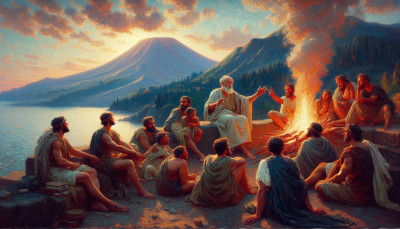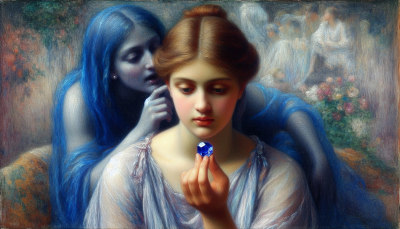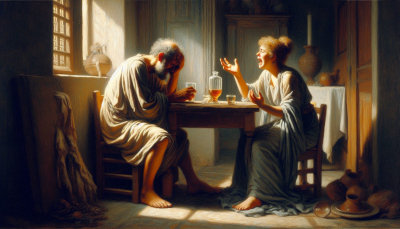The Indigo Jewel
Chapter 5 - Xanthippe and Socrates
Intro,
1,
2,
3,
4,
5,
6,
7,
8,
9,
10,
11,
12,
13,
14,
15,
16,
17,
Epilogue,
Afterward
I hold the wisdom of generations in the palm of my hand, but the more I learn, the less I truly understand. - Xanthippe (468-395 BC)
I have spent countless hours reliving the experiences of my mother, Sophia. She was a brave woman whose courage brought us to Athens many years ago. It was her vision that moved us from slavery to aristocratic society, forever changing the course of our lives.
When she and Alec first arrived, they were sold to separate households, just a stone's throw apart. Athens, with all its lofty talk of democracy, holds more slaves than citizens. They are hypocrites.
Their first months in the city were difficult, but the jewel was mindful of Sophia and guided her steps each day through the voices and counsel of our grandmothers. Within a year, she was running the household. Her master, Empedocles of Agrigentum, was enchanted by her beauty and gave her special attention. She was powerless against his advances. As her master, he had absolute control over her fate, but as the head of the household, she was granted unusual privileges. She used them to be near Alec whenever she could.
In the spring, she bore a daughter whom Empedocles named Xanthippe, believing the child to be his own. It was an arrangement that ensured our survival, though Alec struggled with the deception. My mother convinced him it was necessary, and so he remained silent.
Empedocles was fascinated by Sophia’s knowledge and intellect. She received daily revelations from our grandmothers, allowing her to converse on subjects beyond the reach of most scholars. Eventually, he taught her to read and write, using her insights to bolster his own reputation. As he gained prominence, my mother and I gained freedom. On my twenty-first birthday, he granted me citizenship, celebrated with an extravagant ceremony.
I have relived that ceremony many times while holding the jewel. The gathering was filled with philosophers, including a young man named Socrates. Each man commented on my beauty through the lens of his own philosophy, engaging in an almost playful debate. When Socrates spoke, he did not dwell on my appearance but on my eyes—how they saw things others could not. We were drawn to each other from that moment. I had already inherited the jewel from my mother and learned eagerly from my grandmothers. Within months, Socrates and I were married.
As Empedocles aged, he became reckless, convinced of his own immortality. To prove it, he threw himself into the fires of Mount Etna before his followers. With his death, I brought my mother and Alec into my home, purchasing Alec’s freedom with my newfound wealth. Though I could not grant them citizenship, I could offer them dignity in their final years.
I remember a conversation I had with one of my grandmothers through the jewel, recounting my life:
“My parents did not always see eye to eye. They argued—loudly! But their love was just as passionate. My brother was born first, then me a year later. Though we were slaves, I grew up surrounded by luxury, with servants, fine food, and the best culture Athens had to offer. When I turned ten, my mother entrusted me with her secret and began preparing me for my role. At first, I did not believe her. It seemed impossible. But then, one day, she placed the jewel in my hand. For eight years, we shared it, unraveling our family’s history and contemplating the future, always aware that the jewel remembers everything we say or think.”
Socrates, despite his love for me, was a proud man, determined to understand my knowledge. He sensed that my wisdom extended beyond ordinary experiences. He pressed me for answers, but when I demurred, his curiosity only grew. At times, our arguments turned heated, his suspicions leading to accusations of infidelity. It was my mother—after her passing—who whispered to me through the jewel, guiding me in how to maintain my love for him despite his doubts and cruelty. I will always be grateful for her wisdom and guidance.
For all his flaws, Socrates was a man of principle. In the end, his defiance of corrupt men led to his downfall. He was accused of subverting the government and the state religion. Given the choice between exile and death, he chose to die rather than live apart from his homeland and family. Oh, the anguish I endured when he made that terrible choice! My grief was boundless, and I turned to the jewel for solace, seeking comfort in the voices of my grandmothers.
It was in that darkness that I sought out my friend Nanshe, the first of us. She had no grandmother to guide her, only the distant visions of those who created the Indigo Jewel in a land far away. She struggled to understand her purpose, resisting for years before finally accepting her destiny. Because of her sacrifice, everything that followed became possible — the daughters born, the wisdom revealed, the quiet ways we shaped the world for the better. Her task was hard.
I greatly enjoy meeting with Nanshe. As everyone who holds the jewel can attest, she is a wonderful storyteller. She can turn the most mundane events into a gripping tale of suspense, and she can tell better stories about the other grandmothers than they can tell about themselves.
And the jewel she held thousands of years ago rests in the palm of my hand.
Copyright © 2025 Elton Smith



